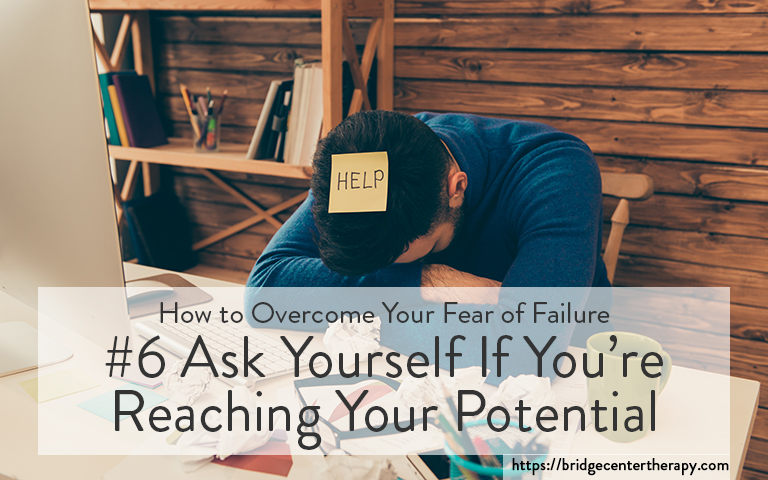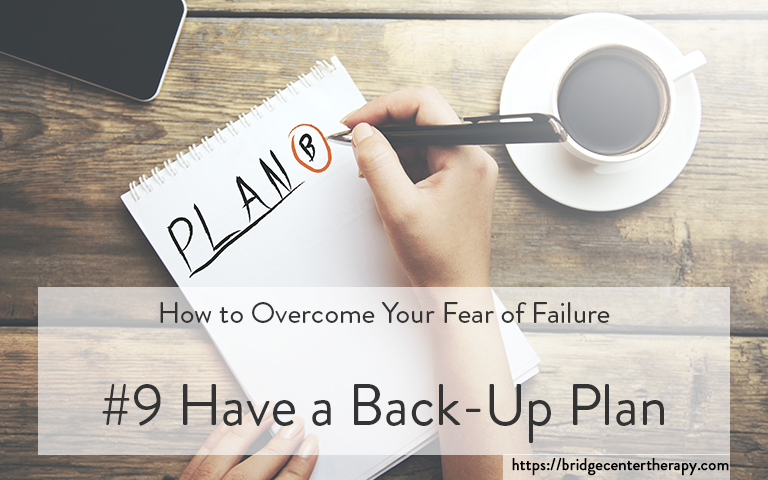
Do you have a feeling of dread when you approach a big project or an even bigger life goal? A serious fear of failure can have an impact on your performance. You might even find yourself aborting the whole plan because of how afraid you are.
Does This Sound Like You?
1- You Experience the Physical Effects of Stress
This can manifest as panic attacks, headaches, sweating, muscle spasms, insomnia and gastrointestinal distress.
Speak to one of our therapists today.
2- You’re Settling for Less Than You Deserve
You are unhappy with your current situation, but you are complacent. You want more, but you don’t attempt to improve your life.
You spend a lot of time planning to take on your goals, but then you run out of time to do what needs to be done.

You don’t answer your phone, make calls or check your email, because you fear hearing bad news.
5- You Procrastinate or Avoid Responsibility
You can’t finish deadline-driven projects. You feel immobilized to perform tasks, because you’re sure you won’t succeed.
6- You Worry About What Other People Think of You
You worry about disappointing others. Your fear makes you believe that other people will lose interest in you if you fail.
7- You’re Not Enthusiastic About Your Future
You feel so uncomfortable, powerless and anxious when you think about how the future will pan out that you don’t bother setting objectives.

8- You Can’t Move On From Failures
It’s normal to feel sad and disappointed, but you may wallow in these emotions and experience prolonged distress.
Facing these fears requires a level of courage you may not believe you have. It will be daunting and it might even be terrifying to admit these insecurities to yourself.
You can get THERE from HERE.
What Can You Do?
By being willing to take the risk, you will make it possible for yourself to experience great success. Here are a few strategies to help you.
1- Identify and Clarify Your Thoughts, Feelings and Actions
When you can pinpoint your specific emotions, you are more likely to take action. Once you identify the self-sabotaging behaviors that are the direct result of this thinking, you can change your actions too.

2- Recognize Unhealthy Attempts to Reduce the Pain
Distracting yourself or trying to fill the void with food, drugs, or alcohol won’t heal your pain.These coping mechanisms do more harm than good. Once you are aware of this, you can work on doing better.
3- Think About the Worst-Case Scenario
The consequences are mostly not as disastrous as you think. Will it really be unbearable? Thinking objectively about it will help you see that failure is not the end of the world and there will always be other options.
4- Think About the Best-Case Scenario
Think of all the great things that can happen if you are victorious. When you think about all the positives that will come from pushing through the fear, you will realize that you might be missing out.
5- Compete With Yourself Before Anyone Else
You can only control yourself. The real battle is with the current version of you. When you make personal progress and overcome some of the struggles of the old you, no one can take away that achievement.

6- Ask Yourself If You’re Reaching Your Potential
Do you want to look back and wonder, “What if?”. Let this motivate you to make up for lost time. Tell yourself that you will be successful if you give your maximum effort. You can make your own luck.
7- Surrender and Feel the Fear
If you just allow yourself to feel it, you will see how quickly it dissipates and how quickly the situation will feel more manageable. The next time you feel paralyzed by fear, just sit quietly and breathe. Soon it will shift.
8- Focus on the Process, Not the Final Product
Sky-high goals seem like they should fire up your motivation, but all that leads to is procrastination. Aim for experiences, learning and trying along the way, instead of the endpoint. You will gain valuable knowledge.

The last thing you want is to scramble for a solution the moment the worst happens. There are usually multiple ways to solve every problem. A back-up plan will give you more confidence to take the risk.
Take the steps and cultivate the attitudes that will help you fight the guilt and embarrassment of failure. Everyone fails. There is no benefit in bullying yourself. Talk to yourself in a supportive, kind and caring way.
Need Help? We Can Help.
Failures can be blessings in disguise. You can go boldly in the direction of your dreams and long-term goals.
But, sometimes fear of failure becomes debilitating. If you’re struggling to function, consider seeking professional help. Call (510) 497-4174 to schedule your free consultation.
If you have any questions or require more information, please contact Lani here: lani@bridgecentertherapy.com
